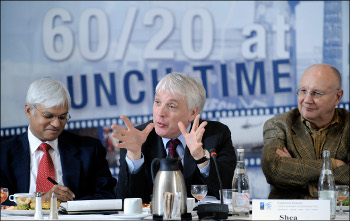Registration
You will receive an email confirming your registration.
IMGXYZ1158IMGZYXAs NATO reaches its 60th anniversary, it faces questions about its future as an international security organization. What is clear is that it will need to develop a comprehensive strategy for dealing with a new generation of security threats: nuclear proliferation, terrorism, cyber-terrorism, climate change and energy security.
At a lunch debate co-hosted with the NATO Public Diplomacy Division, Jamie Shea, Director of Policy Planning in the Private Office of NATO SG, and Ashley J. Tellis, Senior Associate at the Carnegie Endowment for International Peace discussed new, emerging security risks and provided an outlook on how and if NATO should respond.
Michael Stopford, Deputy Assistant Secretary General of NATO, delivered the opening remarks. Commentators included Pierre Goldschmidt, Non Resident Senior Associate at the Carnegie Endowment, and former Deputy Director General of the International Atomic Energy Agency, Garry Hindle, Head of Security and Counter-Terrorism at the London-based Royal United Services Institute (RUSI), R. Andreas Kraemer, Director of the Ecologic Institute in Berlin, Brussels and Vienna, Chairman of the Ecologic Institute in Washington D.C., and Brooks Tigner, Chief Editor for Security Europe and editor at Jane's. The luncheon discussion was chaired by Fabrice Pothier, Director of Carnegie Europe.
Challenges for NATO
NATO is an alliance that must reinvent as the global security landscape otherwise it faces the danger of becoming obsolete. NATO faces such a moment of reinvention today in an increasingly multipolar world.
NATO and its member states will need to find a way to prevent a possible internal fragmentation as this reinvention evolves. As security threats multiply, it is becoming difficult for member states to share the same security priorities. This may signal the end of ‘collective security’ as the defining factor in NATO relations.
Cooperative Security
NATO will need to start working in partnership with other multilateral organisations, like the UN if it hopes to find effective permanent solutions to the security challenges facing the world. Although NATOs presence is often a condition of success, it is increasingly insufficient. In Afghanistan, for instance, there is a need for a coordinated effort with development and reconstruction agencies. NATO currently must play both a security and nation-building role. It was not designed for the latter, and cannot hope to create the conditions for military withdrawal without a concerted development effort.
New Security Threats – Should NATO be involved?
Ashley J. Tellis argued that involvement in threats like cyber terrorism, climate change, terrorism and proliferation is not going to be optional for NATO. These threats will be at the core of fulfilling its obligations to the security of its member states. NATO’s military missions, for example, will no longer be conducted in a world that is free from the threat of weapons of mass destruction. The alliance will need to be able to balance these threats with its capabilities if it hopes to neutralise them.
Should Climate Change be a Priority?
As security threats become more diverse, and dealing with them becomes more resource intensive, NATO will need to start prioritising which threats it deals with. R. Andreas Kraemer argued that addressing climate change and the security concerns that resource scarcity will raise should be a priority – even at the expense of continued action in Afghanistan. Although there is little justification for military intervention on most of the problems caused by climate change, there is a need to discuss what NATO’s role could play given its invaluable field experience in crisis response.
Jamie Shea agreed, suggesting that NATO should act as a strategic hub to generate international momentum. The job of coordinating strategies to combat climate change could then be passed on to organisations more suited to dealing with the threat.
Terrorism
Terrorism fundamentally remains a policing and intelligence problem. However, NATO’s peacekeeping and stabilisation operations will place it in theatres where terrorism is a significant threat. Garry Hindle argued that NATO should maintain a knowledge base of terrorism and terrorist activity, whilst handing the responsibility of counterterrorism over to a domestic police and intelligence services.
Russia
Goldschmidt argued that negotiation with Russia should be a priority. NATO will not be able to effectively respond to the most pressing threats of the 21st century without Russia as an ally. He pointed to Iran and its nuclear capabilities as an example. If Iran is allowed to continue to develop its nuclear program , the Nuclear Non-proliferation Treaty will become obsolete and a nuclear arms race in the Middle East could ensue. NATO will need to consider what an appropriate response to this threat looks like. Does it develop missile shields in Europe? Or does it attempt to gain leverage with Iran through Russia at the expense of Europe based missile defence shields?
Goldschmidt argued for the second option, recognising that Russia is an important player not only in Iran, but also in Syria, the wider Middle East, and Central Asia and South East Asia. Russia’s cooperation in these regions would be worth sacrificing missile defence shields in Europe.
Some commentators disagreed with Goldschmidt on this approach to negotiating with Russia. The financial crisis has had a huge impact on Russia’s leadership, who are increasingly aware that interdependence has become intrinsic to its own survival. The Russian government will be more willing to cooperate with the West on key aspects of security where common interests exist. Ashley J. Tellis agreed with this point, adding that whilst NATO needs a strategy of reassurance towards Russia, reassurance cannot come at the cost of doing what is necessary for the defence on its member states.
